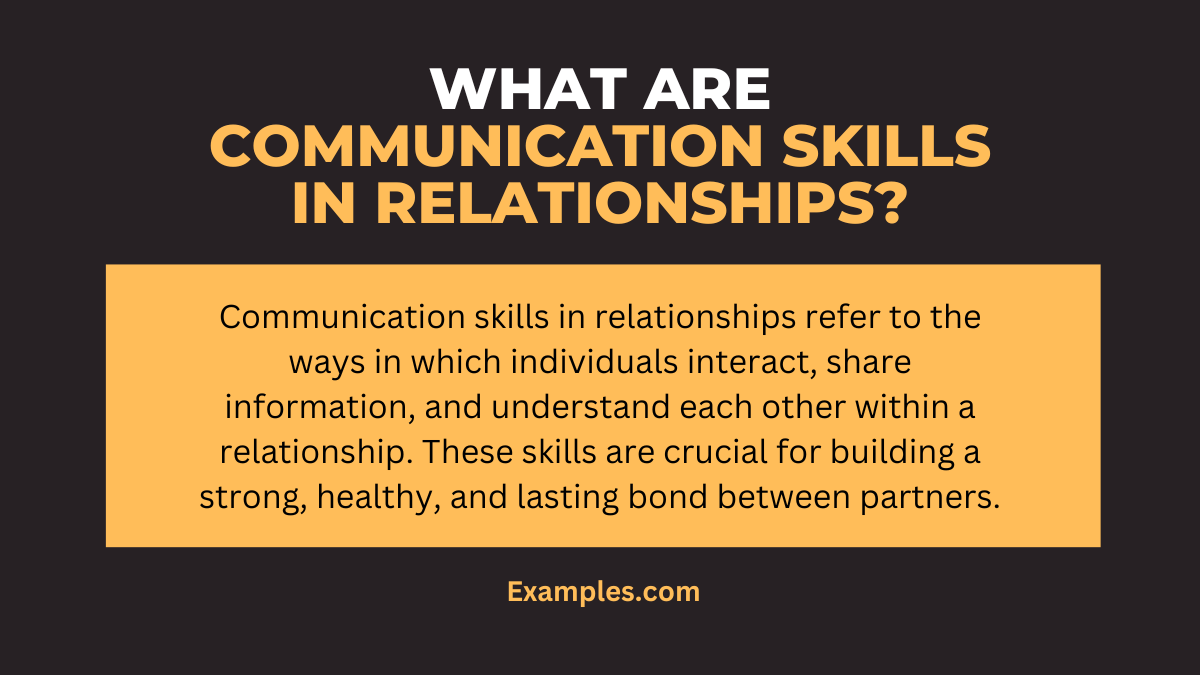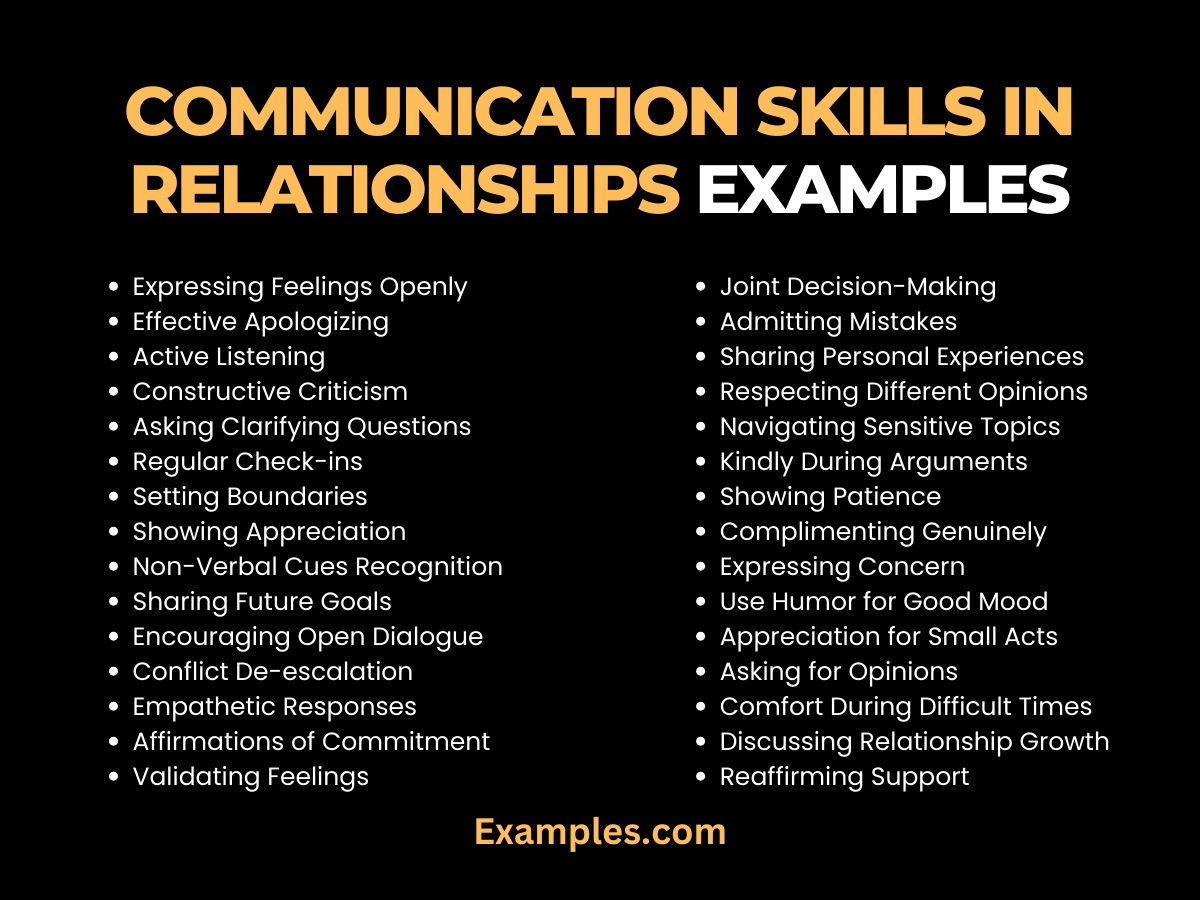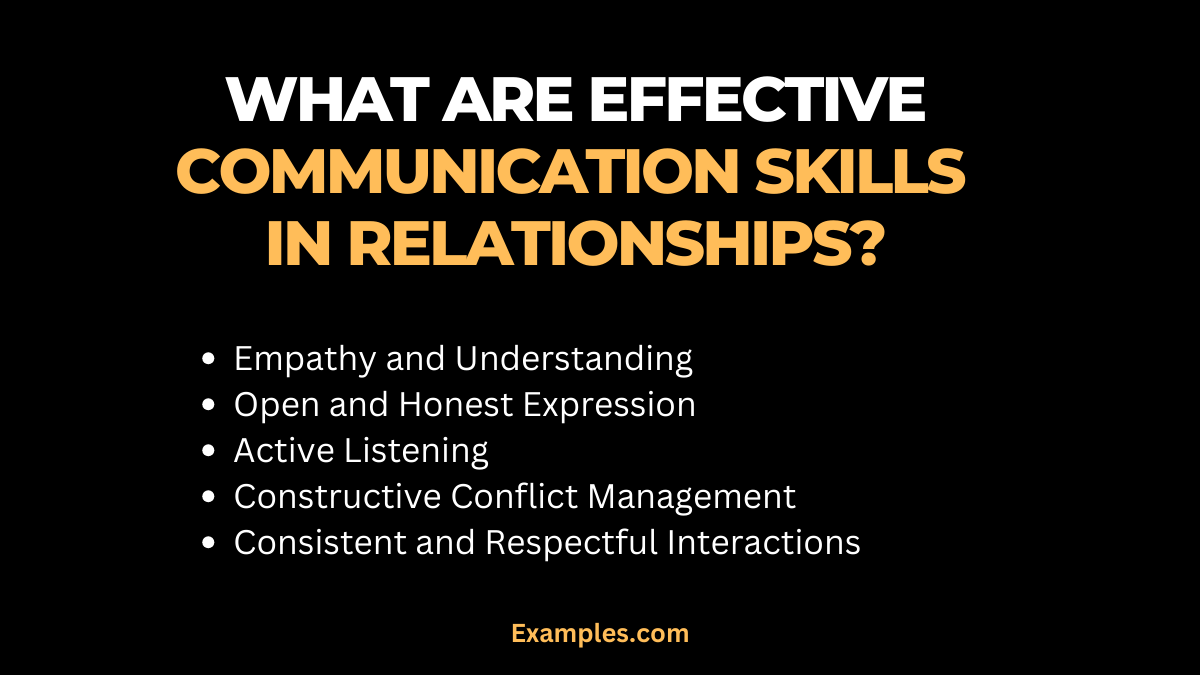29+ Communication Skills in Relationships Examples
Strong communication is the cornerstone of healthy and fulfilling relationships. This guide offers a deep dive into the art of effective communication in relationships, enriched with practical communication examples. From understanding non-verbal cues to mastering the art of active listening and compassionate speaking, these skills are essential for building trust, resolving conflicts, and deepening connections. Whether you’re navigating a romantic partnership, family dynamics, or friendships, this guide provides valuable insights and strategies for enhancing communication and strengthening your relationships.
What are Communication Skills in Relationships?

Communication skills in relationships refer to the ways in which individuals interact, share information, and understand each other within a relationship. These skills are crucial for building a strong, healthy, and lasting bond between partners. They involve various forms of interaction, from verbal and non-verbal communication to empathetic listening and clear, respectful expression of thoughts and feelings.
Key Components
- Verbal Communication: The words we choose and how we say them can significantly impact our relationships.
- Non-Verbal Communication: Body language, facial expressions, and gestures often convey more than words.
- Listening Skills: Truly listening to a partner is fundamental in understanding their perspective.
- Empathy: Putting oneself in the partner’s shoes to understand their emotions and viewpoint.
- Conflict Resolution: Addressing disagreements constructively without harming the relationship.
30 Communication Skills in Relationships Examples

Effective communication is the cornerstone of healthy relationships. This guide offers 30 unique and distinct examples of communication skills crucial for nurturing strong, understanding, and supportive relationships. Each example includes practical communication sentences to illustrate how these skills can be applied in real-life scenarios. From expressing feelings to resolving conflicts and showing appreciation, these examples cover a wide range of interactions that foster closeness, trust, and mutual respect in relationships.
- Expressing Feelings Openly: “I feel happy when we spend quality time together.”
Encourages sharing emotions honestly to enhance connection. - Active Listening: “What I hear you saying is that you need more support from me.”
Demonstrates attentiveness and understanding of the partner’s perspective. - Effective Apologizing: “I’m sorry for my part in our disagreement; I should have been more patient.”
Shows taking responsibility and willingness to mend issues. - Constructive Criticism: “I appreciate your efforts, but maybe next time we could try this differently.”
Offers feedback in a positive and helpful manner. - Asking Clarifying Questions: “Can you explain what you meant by that? I want to understand your point of view.”
Seeks clarity to prevent misunderstandings. - Regular Check-ins: “How are you feeling about our plans for the weekend?”
Ensures both partners are on the same page. - Setting Boundaries: “I need some alone time to recharge. Let’s talk later?”
Communicates personal needs respectfully. - Showing Appreciation: “I really value the effort you put into our relationship.”
Expresses gratitude, enhancing the bond. - Non-Verbal Cues Recognition: Responding to a partner’s body language with appropriate concern or comfort.
Indicates awareness and responsiveness to unspoken feelings. - Sharing Future Goals: “I envision a future where we both can pursue our dreams.”
Discusses hopes and plans, strengthening the partnership. - Encouraging Open Dialogue: “Let’s talk about what we both need from our relationship.”
Promotes open and honest discussions about relationship dynamics. - Conflict De-escalation: “Let’s take a break and come back to this conversation when we’re calmer.”
Aims to resolve disagreements constructively. - Empathetic Responses: “It sounds like you had a tough day, want to talk about it?”
Offers support and understanding in times of stress. - Affirmations of Love and Commitment: “I love you and am committed to working through challenges together.”
Reinforces love and commitment during difficult times. - Validating Feelings: “Your feelings are completely valid, and I understand why you’d feel that way.”
Acknowledges and respects the partner’s emotions. - Joint Decision-Making: “What do you think is the best approach for us in this situation?”
Encourages collaboration in decisions affecting the relationship. - Admitting Mistakes: “I realize now that I was wrong. How can we move forward?”
Shows humility and a willingness to improve. - Sharing Personal Experiences: “When I went through something similar, I felt…”
Deepens understanding by sharing personal stories. - Respecting Different Opinions: “I see your point, even though I have a different perspective.”
Shows respect for differing viewpoints. - Navigating Sensitive Topics: “Let’s discuss this sensitively, considering each other’s feelings.”
Approaches delicate subjects with care and respect. - Speaking Kindly During Arguments: “I’m upset, but I still respect and care for you.”
Maintains respect even in heated moments. - Showing Patience: “Take your time explaining; I’m here to listen.”
Demonstrates patience in communication. - Complimenting Genuinely: “You always find ways to make me smile, even on tough days.”
Offers sincere compliments to uplift the partner. - Expressing Concern: “I’m worried about how stressed you’ve been feeling lately.”
Communicates concern for the partner’s well-being. - Using Humor to Lighten the Mood: “Remember when we accidentally dyed the cat pink?”
Uses shared humor to create a lighter atmosphere. - Sharing Appreciation for Small Acts: “Thank you for making coffee this morning. It was a lovely start to the day.”
Acknowledges and appreciates small acts of kindness. - Asking for Opinions: “I value your opinion; what do you think about this?”
Respects the partner’s insights and viewpoints. - Comforting During Difficult Times: “I’m here for you, no matter what you need.”
Provides comfort and reassurance during challenging periods. - Discussing Relationship Growth: “How do you think we’ve grown as a couple?”
Reflects on the relationship’s progress and areas for improvement. - Reaffirming Support: “Whatever decision you make, I’ll support you.”
Expresses unconditional support and solidarity
What are Effective Communication Skills in Relationships?

Effective communication skills in relationships are those that contribute to mutual understanding, respect, and trust between partners. They are essential for navigating the complexities of a relationship and maintaining a healthy emotional connection.
Active Listening
- Patiently Listening: Giving undivided attention when your partner speaks without interrupting.
- Acknowledgment: Showing that you understand and value their feelings and viewpoints.
Open and Honest Expression
- Transparency: Sharing thoughts and feelings openly without hiding or manipulating information.
- Directness: Being clear and straightforward in expressing needs and expectations.
Empathy and Understanding
- Empathetic Responses: Demonstrating understanding and care for your partner’s emotions.
- Validation: Acknowledging and respecting your partner’s feelings and experiences.
Constructive Conflict Management
- Calm Approaches: Handling disagreements with calmness and rationality.
- Finding Solutions: Focusing on finding mutually acceptable solutions rather than winning arguments.
Consistent and Respectful Interactions
- Regular Communication: Keeping the lines of communication open on a regular basis.
- Respectful Discourse: Maintaining respect, even during disagreements or stressful times.
Incorporating these communication skills into a relationship can significantly enhance mutual understanding, deepen emotional connections, and foster a nurturing and supportive environment.
Why are Communication Skills Important in a Relationship?
Effective communication skills are the cornerstone of healthy, strong relationships. They foster a deep understanding and trust, which are essential for resolving conflicts and building emotional intimacy. Clear communication allows partners to express their needs, desires, and concerns openly, minimizing misunderstandings. In relationships, being able to effectively communicate ensures that both individuals feel heard, valued, and respected, which strengthens the bond and promotes mutual satisfaction.
Building Emotional Intimacy
- Sharing feelings openly cultivates emotional closeness.
- Understanding and empathy grow through meaningful conversations.
Conflict Resolution
- Clear, respectful communication helps resolve disagreements constructively.
- Discussing issues calmly prevents escalation and nurtures harmony.
Mutual Understanding and Respect
- Regular communication fosters deeper understanding of each other’s perspectives.
- Mutual respect is maintained through honest and considerate dialogue.
How to Improve Communication Skills in Relationships?
Improving communication skills in relationships involves active effort from both partners. Here are some key strategies:
Active Listening
- Pay full attention when your partner speaks, showing that their thoughts matter.
- Validate their feelings to show understanding and empathy.
Open and Honest Expression
- Share thoughts and feelings honestly but respectfully.
- Avoid holding back important emotions or information.
Non-Verbal Communication
- Be aware of body language, as it can often speak louder than words.
- Maintain eye contact and open posture to show engagement and sincerity.
Regular Check-Ins
- Schedule regular times to talk about your day and feelings.
- Use these moments to connect and update each other on personal matters.
Tips for Healthy Communication Skills in Relationships
Here are some practical tips to enhance communication in relationships:
Use “I” Statements
- Frame your sentences with “I feel…” to express your own emotions without blaming.
- This approach reduces defensiveness and fosters constructive dialogue.
Practice Empathy
- Try to see things from your partner’s perspective.
- Show genuine interest and concern for their feelings.
Stay Calm During Disagreements
- Take a deep breath and remain calm during conflicts.
- If emotions run high, take a break and revisit the conversation later.
Clear and Concise Communication
- Be clear and direct about your needs and expectations.
- Avoid using vague or ambiguous language.
Positive Reinforcement
- Appreciate and acknowledge your partner’s efforts in communication.
- Positive feedback encourages continued open dialogue.
Avoid Assumptions
- Clarify instead of assuming you know what your partner means.
- Ask questions if you’re unsure about their message.
By actively working on these communication skills, couples can deepen their connection, resolve conflicts amicably, and build a lasting and fulfilling relationship.
Nurturing Growth Through Communication Effective communication is more than a skill; it’s a bridge that connects hearts and minds in relationships. Embracing open dialogue and empathetic listening nurtures a sense of security and understanding, laying the groundwork for lasting bonds and mutual growth. For further insights into fostering healthier communication in relationships, the American Psychological Association (APA) offers a wealth of resources. Visit APA’s resource on healthy relationships for expert guidance.
Strengthening Bonds with Effective Dialogue Remember, the strength of a relationship often lies in the quality of communication. By adopting effective communication strategies, couples can overcome challenges and build a resilient bond that withstands the test of time. For those seeking deeper exploration into enhancing interpersonal communication, resources such as Psychology Today’s communication articles provide valuable perspectives and tips from leading experts in the field.
In conclusion, effective communication in relationships is fundamental to building trust, understanding, and lasting connections. By honing skills like empathy, active listening, and clear expression, individuals can navigate the complexities of interpersonal relationships with greater ease and depth. Whether in personal or professional settings, mastering these communication skills is key to fostering healthy, supportive, and fulfilling relationships.



